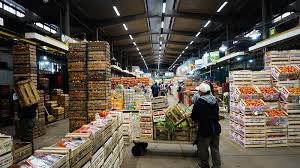Few measures are as unpopular with the profession, which sees prices as both a signal of scarcity and a spur to overcome it.
很少有措施像这个行业那样不受欢迎,这个行业认为价格既是稀缺的信号,又是克服稀缺的激励。
Controlling them scrambles the signal and blunts the spur. Price floors result in food rotting in warehouses.
管制它们会扰乱信号,削弱刺激。最低价格导致食品在仓库中腐烂。
Ceilings lead to underinvestment, hoarding and black markets.
限额会导致投资不足、囤积和黑市交易。
Efforts to stabilise prices at home can increase volatility abroad. Export bans, for example, force farmers to sell domestically, worsening global shortages.
国内稳定物价的努力可能会加剧国外的波动。例如,出口禁令迫使农民在国内出售粮食,加剧了全球粮食短缺。
The World Bank reckons that governments' attempts to insulate their countries
世界银行估计,在2010到2011年,政府试图使他们的国家
from higher food prices accounted for 40% of the increase in world wheat prices in 2010-11.
不受更高的食品价格的影响,这占了世界小麦价格上涨原因的40%。
One reason not to impose price controls is that they are so hard to remove.
不实施价格管制的一个原因是,价格管制很难取消。
"We struggled to find an example where it has gone very smoothly,"
世行《全球经济展望》报告的主要作者之一表示:“
says Franziska Ohnsorge, a lead author of the bank's "Global Economic Prospects" report.
我们很难找到一个进展非常顺利的例子。”
A fare increase last year on Santiago's metro of 30 pesos ($0.04) was the trigger for widespread unrest
去年圣地亚哥地铁票价上涨了30比索(0.04美元),

that brought Chile's army onto the streets and resulted in 29 deaths.
引发了广泛的动乱,智利军队走上街头,造成29人死亡。
When removing price controls, it helps to get the timing right. With ceilings, it is best to act when market prices are low.
当取消价格管制时,它有助于把握正确的时机。有了上限,最好在市场价格较低时采取行动。
Ivory Coast, Mexico and Rwanda took advantage of the oil-price slump after 2014 to reduce their fuel subsidies.
科特迪瓦、墨西哥和卢旺达利用2014年后油价下跌的机会减少了燃料补贴。
The bank also recommends linking the removal of price controls with offsetting measures to help the needy.
世行还建议将取消价格管制和抵消措施联系起来以帮助需要的人。
Egypt, for example, increased spending on health and education after raising prices for gas, petrol and electricity.
例如,埃及在提高燃气、石油和电力价格后,增加健康和教育上的支出。
But not everyone was appeased. Many people who know that higher prices will hurt them doubt that higher social spending will ever help them.
但并不是每一人都满意。很多知道更高价格会伤害到自己的人不相信高社会支出会帮助他们。
In 2010 Iran tried to overcome such scepticism by giving money to households to compensate them for a reduction in fuel subsidies.
2010年,伊朗试图通过向家庭提供资金以补偿燃料补贴的减少来克服这种怀疑。
In an ingenious twist, it paid the transfers first, depositing the money in accounts that were locked until prices were lifted.
一个巧妙的转变是,它首先支付转账,将钱存入锁定的账户,直到价格上涨。
It is a lesson other countries should heed, argues Shanta Devarajan, a former World Bank economist.
前世银经济学家Shanta Devarajan认为这是其他国家应该吸取的教训。
Unfortunately, Iran itself seems to have forgotten it. In November it raised fuel prices sharply and suddenly.
不幸的是,似乎伊朗自己已经忘了。在11月,其突然大幅提高了燃料价格。
Protesters poured onto the streets. "It's very difficult to remove these controls," says Ms Ohnsorge. "It's better not to have them in the first place."
抗议者涌上街头。Ohnsorge女士称,“取消这些控制非常困难”。“最好是一开始就不要进行价格管制。”
译文由可可原创,仅供学习交流使用,未经许可请勿转载。



